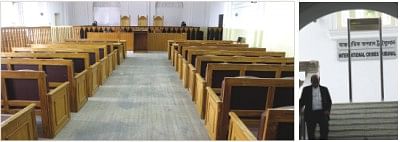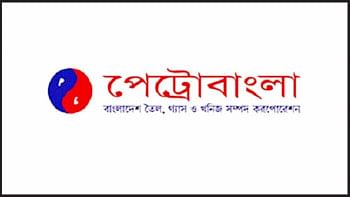Int'l crimes tribunal starts proceedings today

International Crimes Tribunal at Old High Court building in the capital is all set for war crimes trial proceedings that are to begin today.Photo: STAR
The special prosecution yesterday filed the first petition with the International Crimes Tribunal seeking direction to show top four Jamaat leaders arrested or detained on charges of committing war crimes in 1971.
The four accused are Jamaat Ameer Motiur Rahman Nizami, its Secretary General Ali Ahsan Muhammad Mojahid and senior assistant secretaries general Muhammad Kamaruzzaman and Abdul Quader Molla.
Four months into the formation of the tribunal, this is the first ever incident in the history of judiciary to seek direction to show any person arrested under the International Crimes Tribunal Act, 1973.
The three-member tribunal headed by Justice Nizamul Huq yesterday accepted the petition and fixed 10:30am today for holding the hearing. Justice ATM Fazle Kabir and Justice AKM Zaheer Ahmed are the other two judges of the tribunal.
The tribunal will today hold its first sitting in the open courtroom set up at the old High Court building. The courtroom was made ready for the prosecution yesterday.
The six-member prosecution team formed only to work in the tribunal submitted the petition to the court through its registrar.
After filing the petition, Chief Prosecutor Golam Arif Tipu briefed journalists saying, "We have submitted a petition against the Jamaat leaders seeking necessary lawful steps from the tribunal to keep them confined.
"We made the prayer so that they cannot escape or create obstruction in the investigation and that the investigation agency can smoothly conduct probes into the allegations against them of committing genocide, murder, rape, torture, loot, and arson during the Liberation War of 1971," he said.
He, however, rejected outright a question of filing the petition for the tribunal's order to show the Jamaat leaders arrested or detained in any specific case including the one filed with Pallabi Police Station which has already been transferred to the tribunal.
Tipu said, "Our petition [against the four] has been filed against them on charges for committing offences under section 3 of the International Crimes Tribunal Act."
The investigation agency will probe offences mentioned in section 3 of the act-- crimes against humanity and peace, genocide, violation of any humanitarian rules during armed conflicts as laid down in the Geneva Convention of 1949, any other crimes under international laws, attempt, abetment or conspiracy to commit any such crimes and complicity in or failure to prevent commission of any such crime.
Hours after Tipu's briefing, Registrar of the tribunal Md Shahinur Islam told newsmen that the investigation agency formed under the International Crimes Tribunal Act started investigation based on a "complaint petition" of July 21 this year in which Nizami, Mojahid, Kamaruzzaman and Molla were made accused.
Sources say this complaint petition is the case of Pallabi Police Station which was transferred to the Tribunal on July 21.
On that day, a Dhaka court sent this case to the tribunal on charge of killing 345 people during the Liberation War.
On January 25, 2008, Mohammad Amir Hossain Mollah, a wounded freedom fighter and resident of Pallabi's Duaripara, filed this case with Pallabi Police Station accusing Nizami, Mojahid, Kamaruzzaman, Quader Molla and three other Jamaat men, and three non-Bangalees for the massacre of 345 people.
The registrar said the chief prosecutor mentioned in the petition that arrest or detention of the four accused is inevitable for fair and effective investigation into the allegations brought in the case.
Prosecution sources say they would soon submit a petition to the tribunal for necessary order to show some other Jamaat leaders arrested or detained on the same charges.
RECORDS OF HISTORY
War records show Jamaat formed Razakar and Al-Badr forces to counter the freedom fighters in 1971. Razakar was established by former Jamaat secretary general Moulana Abul Kalam Mohammad Yousuf while Al-Badr included the members of Islami Chhatra Sangha.
Study of history also shows Matiur Rahman Nizami, incumbent Ameer of Jamaat, was the then president of Islami Chhatra Sangha.
He was quoted as saying on September 15, 1971 by Jamaat's mouthpiece the Daily Sangram: "Everyone of us should assume the role of a Muslim soldier of an Islamic state and through cooperation to the oppressed and by winning their confidence we must kill those who are conspiring against Pakistan and Islam."
Nizami's speech is evident in the September 8, 1971 issue of the Daily Sangram that carried a report headlined "Chhatra Sangha activists will protect every inch of Pakistan's land".
In 1971, Mojahid directed his party workers to build Al-Badr Bahini to resist freedom fighters, according to a "Fortnightly Secret Report on the Situation in East Pakistan". In line with an official procedure, the report had regularly been dispatched by the then East Pakistan home ministry to General Yahya Khan, the head of the government.
Many researches, academic studies, accounts of both victims and collaborators, and publications including newspapers revealed that Mojahid, who headed the Al-Badr force in Dhaka at the time, allegedly led those who had been involved in killing intellectuals on December 14, 1971, two days before the victory of Bangladesh.
Muhammad Kamaruzzaman has a tainted past with Islami Chhatra Sangha and is blamed for his close link with Al-Badr.
"The Chhatra Sangha of Mymensingh district was converted into the Al-Badr force and provided with military training. The man responsible for organising the Chhatra Sangha into the militia force was Kamaruzzaman, the then chief of Mymensingh District Islami Chhatra Sangha," a book titled Genocide '71 says.
In the early 1990s, People's Inquiry Commission was formed to investigate the activities of the war criminals and collaborators of Pakistan.
Abdul Quader Molla was known as "butcher" to Bangladeshis in the Dhaka suburb of Mirpur in 1971, according to the report of the commission headed by the late poet Begum Sufia Kamal.

 For all latest news, follow The Daily Star's Google News channel.
For all latest news, follow The Daily Star's Google News channel. 



Comments